Veterinary & Biosecurity
“We are now citizens of the planet, The planetary phase of civilization”
Published
3 years agoon
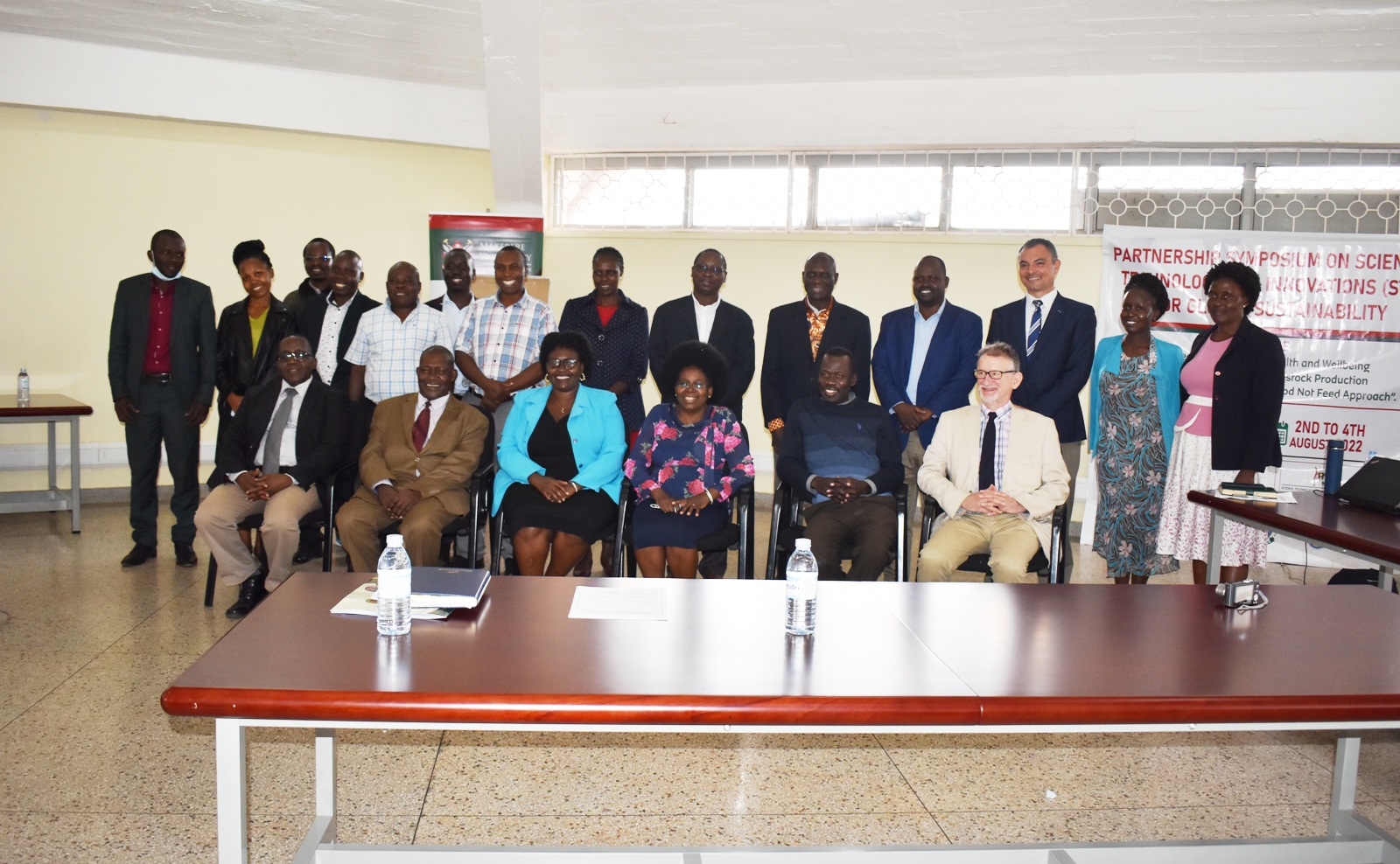
One world – One farm – One health
Makerere University recently signed a Declaration of intent to join Global Farm platform network and partnership, one of whose objectives is to establish a global academic network to promote farm research platforms for optimization of ruminant livestock production and hence contribute to food security, sustainability and poverty alleviation.
The Global Farm Platform offers an opportunity for conducting large transnational research, collection and exchange of big data and scientific exchanges and application of cutting edge technologies.
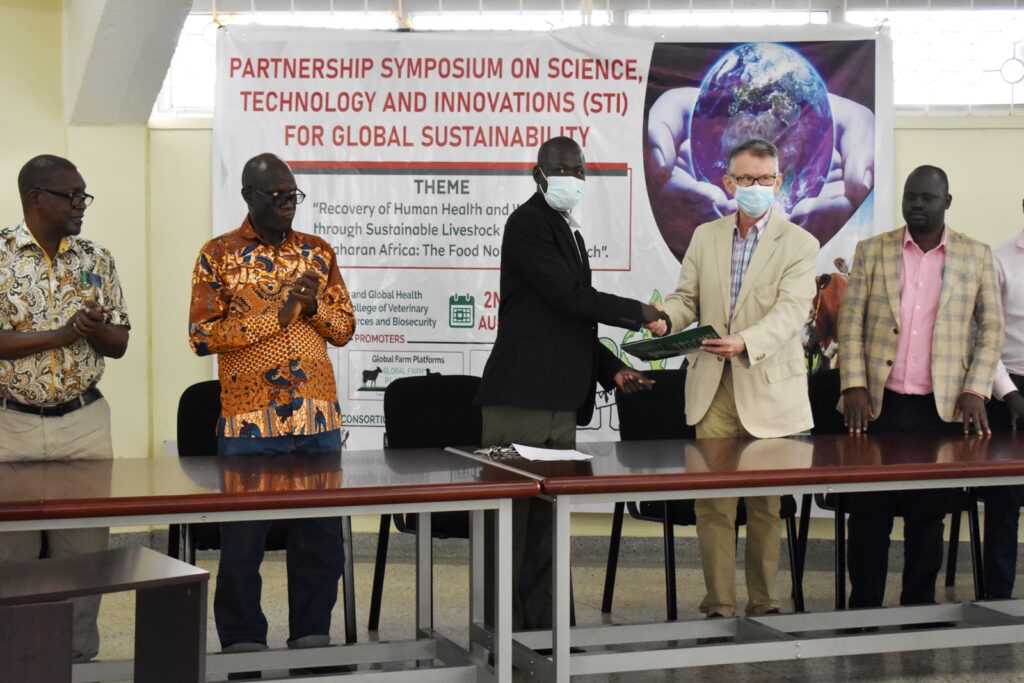
The signing of the declaration of intent followed a three-day partnership symposium on Science, Technology and Innovation (STI) conducted at the College of Veterinary Medicine, Animal resources and Bio Security (CoVAB) from 2nd to 4th August 2022.
With support from Worldwide Universities Network (WUN), the symposium brought together stakeholders from the University of Bristol UK, Lilongwe University of Agriculture and Natural resources Malawi, University of Ghana, Busitema University, National Agricultural Research Organization (NARO), Africa Institute for Strategic Animal Resource Services and Development (AFRISA) and the host Makerere University.
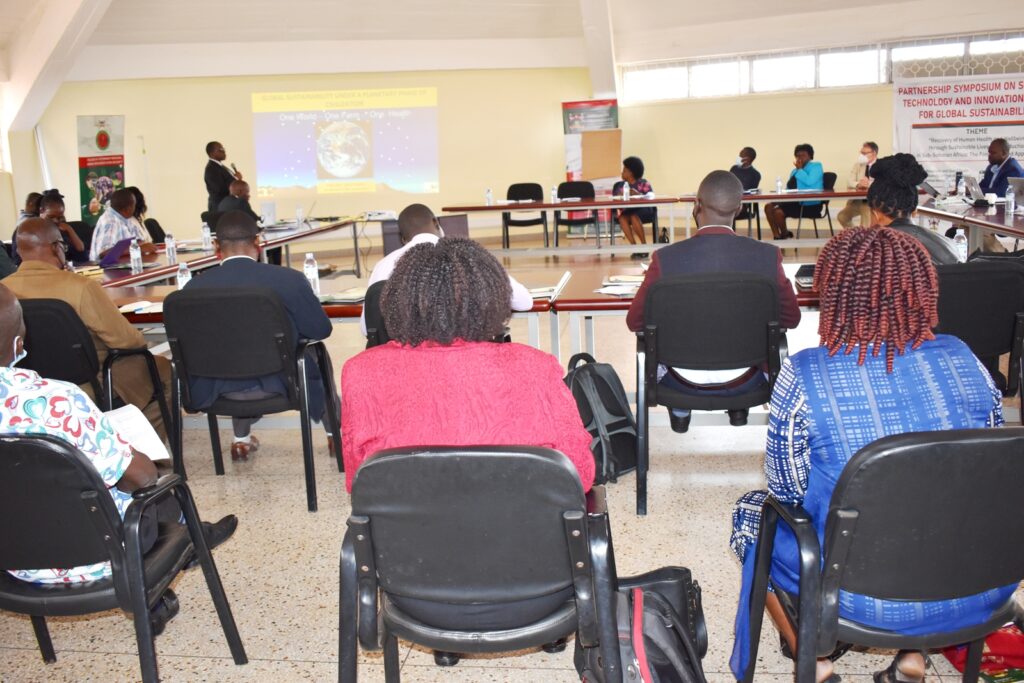
The symposium that was hosted by the Centre for Biosecurity and Global Health at CoVAB focused on the Theme; Recovery of Human Health and Wellbeing through sustainable Livestock Production in Sub Saharan Africa: The Food Not Feed approach.
It was premised on the realization that the food-feed competition of human food was one of the complex challenges that had greatly contributed to climate change, land degradation and water shortages in an effort to have sustainable food production. The One world – One farm approach that has been found crucial in redressing the food and not feed approach and the climate change challenges set out to look for multifaceted solutions through collaboration and partnerships. The symposium therefore was convened to reflect on and provide input into sustainable livestock development and production in sub-Saharan Africa in the wake of the globalization of the economy, climate change and pressure for safe food. It was also among other things aimed at developing research groups to promote science, technology and innovations in accelerated livestock production and productivity and for universities to build strong Global farm platform networks.
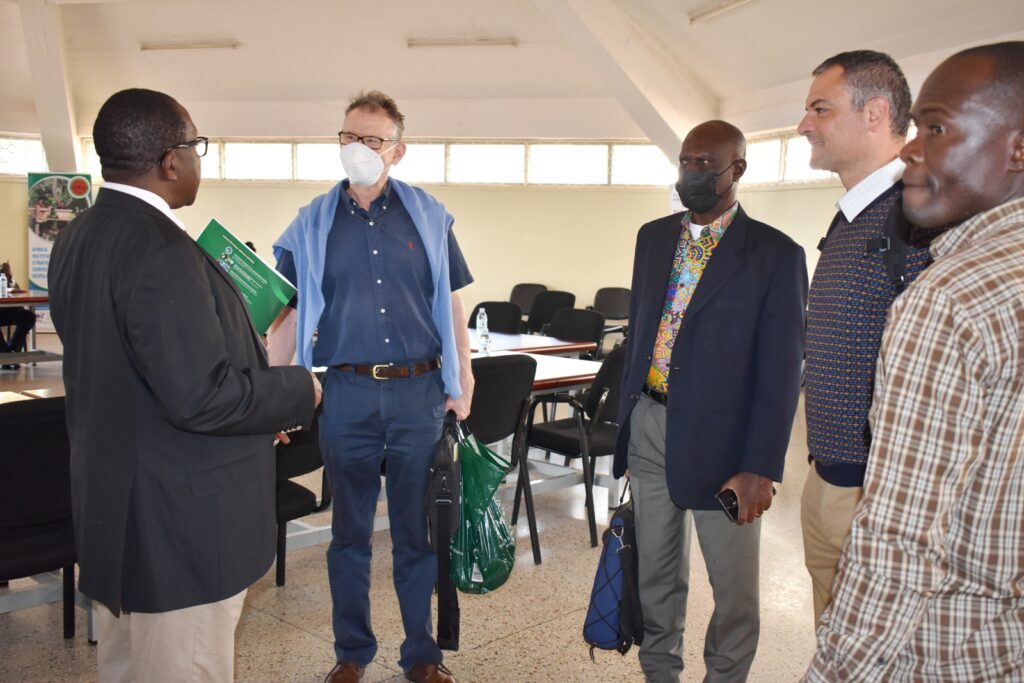
The Deputy Principal College of Veterinary Medicine, Animal Resources and Biosecurity Prof. James Okwee Acai welcomed the participants and expressed gratitude towards the Minister for Science, Technology and Innovations for her continued support to the College which he said, was a manifestation of the trust in the output of the college. He noted that her presence at the symposium was an indication of the commitment that the Ministry had in building the much needed partnerships.
While addressing himself to the theme, Prof. Acai said the symposium brought together a great team of partners as evidenced from the Universities represented as well as the Makerere University team led by Prof. John David Kabasa. He expressed optimism that the outputs would contribute greatly towards the realization of the much needed synergies in livestock research output drawing lessons from the partnerships involving the North and South.
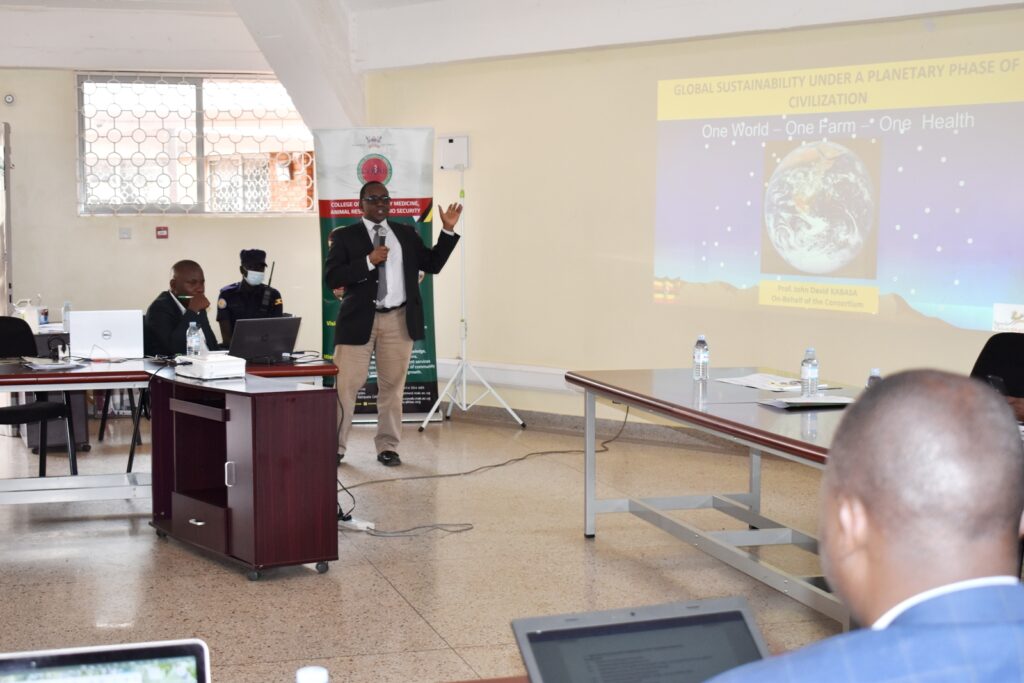
Makerere University’s Prof. John David Kabasa who made remarks on behalf of the consortium noted that the universe was in the planetary phase of civilization which he described as a state of increased global interdependence. He said it was necessary that they discussed ways of ensuring sustainable production in the wake of climate change and other challenges facing the world. While giving reference to the concept of One world – One farm – One health, Prof. Kabasa said that until recently with the onset of COVID- 19 and the Ukraine War and their effect on our livelihood, we did not know that we were linked to one another.
Prof. Kabasa illustrated the composition of a healthy plate that should include carbohydrates, proteins and vegetables. He said this was required by the Eight Billion people living on the planet. ‘Where will a healthy plate come from with the increasing population vis the existing land and water resources’ queried the Professor, while encouraging land use change. ‘The model of burying should change since it is not sustainable, food must increase, urbanization and peasantry displacement is inevitable,’ he explained while emphasizing the need for better, scientifically proven methods of increased productivity in order to satisfy the food demand.
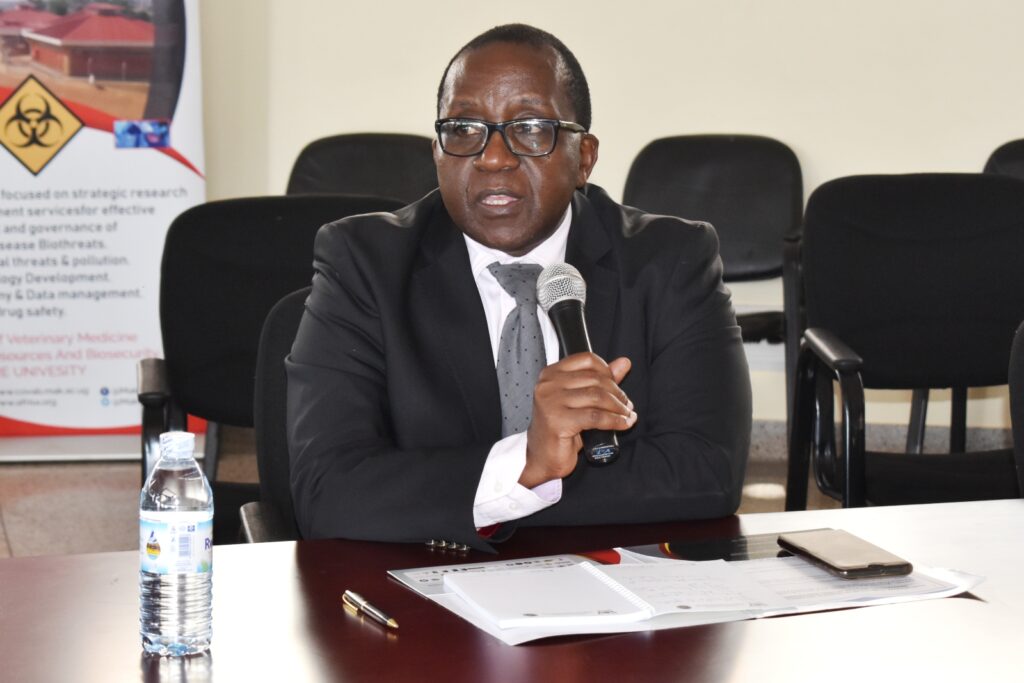
Prof. Kabasa noted that although the existing challenges were created by Science Technology and Innovation, it was the same way that they could be redressed. He urged the College of Veterinary Medicine, Animal Resources and Bio security to take lead in the intensification of production of animal sources of food to help meet the projected demand.He cautioned that unless there was a change, the kind of science we were doing would lead to our own displacement and cited the example of the daily meat demand that stood at 40 million kilograms. ‘As we intensify, you must produce on land, below the land and above the land’ he said.
Prof. Kabasa pointed out the challenge of the greenhouse emissions and urged scientists to come up with the right models of production. ‘Scientists must come out loudly to address the challenges we have created ourselves. We need new brains to redress the issue of poison which is destroying the biodiversity’. He noted.
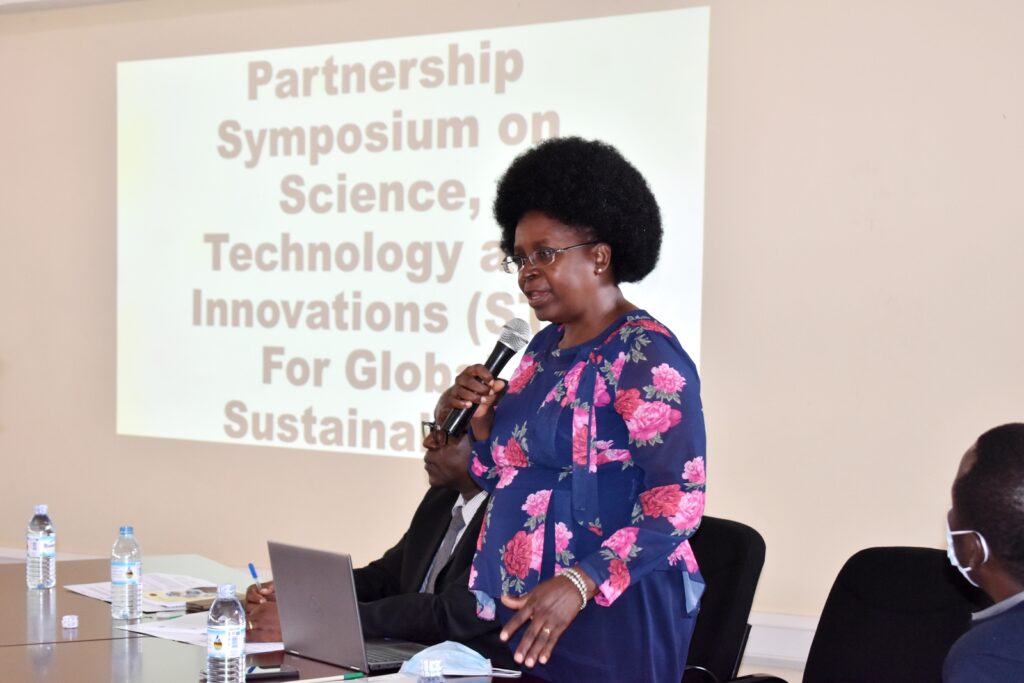
He said that being part of the global farm required addressing the modes of production that had led to the rejection of products from Africa leading to market loss, which meant no jobs, leading to labor export, while importing products. ‘When will you scientists become angry. Even your own children will be exported’, he said. Kabasa also stressed the need to re-orient the science Technology Innovations pathways to industrial value chains and away from a commodity based thinking. At CoVAB, through the various schools there were pillars of industrial value chains including medicine resources, wild life resources, biomolecules, bio lab resources as well as household resources, he said.
Hon. Monica Musenero Musanza, The Minister for Science, Technology and Innovations while opening the symposium noted that for long Africa had relegated the responsibility of thinking and depended on the thoughts from others. All this has not helped Africa, she observed, and the current thought process was to provide the next leaders, citing the think tank that exists at her ministry.
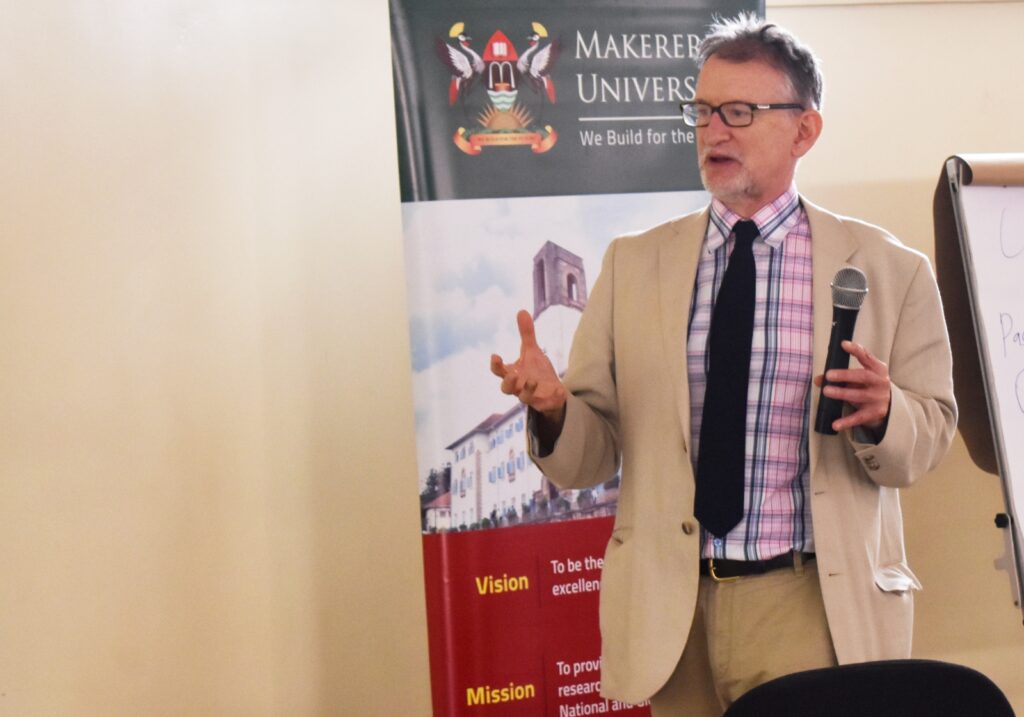
While giving the example of the Mbale flood tragedy that had left scores dead, Hon. Musenero noted that such a scenario was a result of action without thinking that led to environmental degradation. She said the symposium would help organize thoughts and that the more the thinking, the better the results. She said the onset of Covid -19 in Africa provided a landmark that pushed us to sit in a thinking chain. ‘The future does not happen but is created. As we sit here and think global sustainability, it means integrity and balance, which are key for sustainability’ she observed. She encouraged the scientists to think of new innovations and continue investing in the thinking process given that 50% of the work in the Science Innovation and Technology sector was thinking. It is unacceptable that a Professor with all the research and teaching has no patent or commercialized product, she stressed.
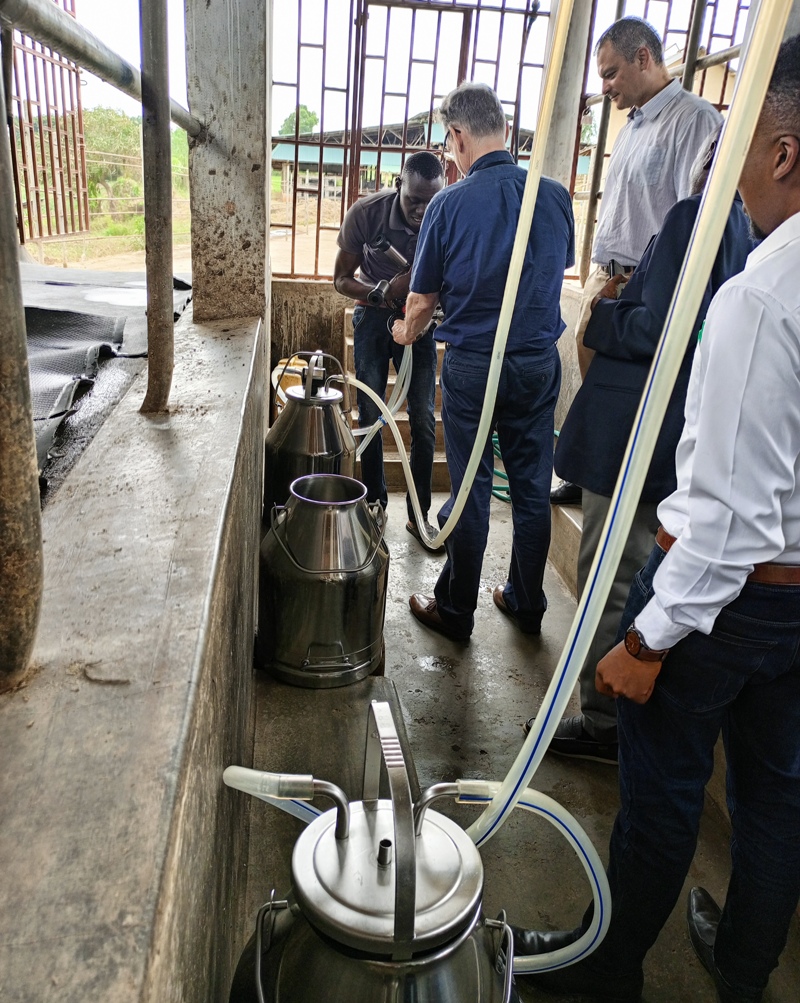
The participants at the symposium took off time to visit some farmers that included Edward Kalemba who is an urban Dairy farmer in Kasangati with eight animals operating in his compound. He uses animal waste to make bio gas while the slurry from the biogas used on his farm.
At the symposium, presentations were made by the respective entities. In the end there were a number of recommendations made that included the establishment of a multi-disciplinary research group to uphold the Global Farm Platform, to collaboratively harness the science Technology and Innovations capacities of African institutions to resolve the challenges of climate change and sustainable livestock development and production as well as developing appropriate and alternative livestock feed and production technologies.
You may like
-
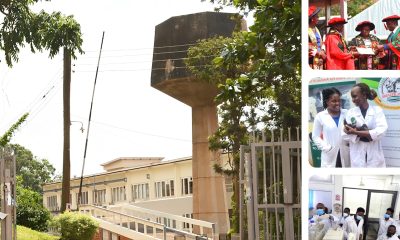

CoVAB Annual Report 2024
-
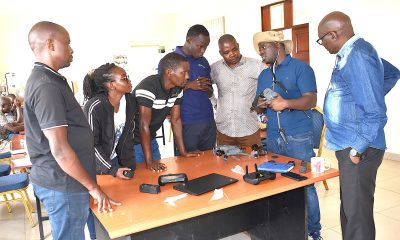

NbS4Tea Project Team Makes Great Progress, Deploys Drones for Data Collection
-
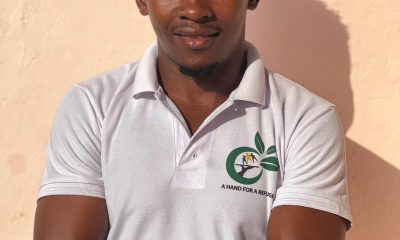

Meet Safali Libia, a Mastercard Foundation Scholar-alumnus who rebuilt his life as a refugee in Uganda
-
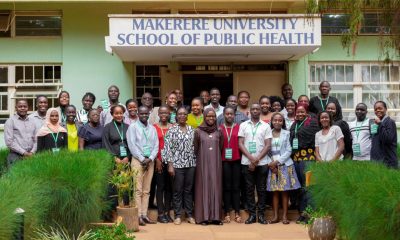

MakSPH, DJC Launch Short Course on Health Communication
-
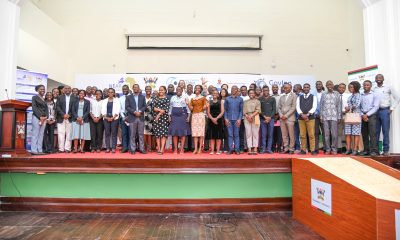

Strengthening Europe-Africa Higher Education Collaboration through the NEAR-ER Project
-


CoNAS Participates in the 2025 National Science Week Exhibition
Veterinary & Biosecurity
CoVAB Annual Report 2024
Published
10 hours agoon
June 30, 2025By
Mak Editor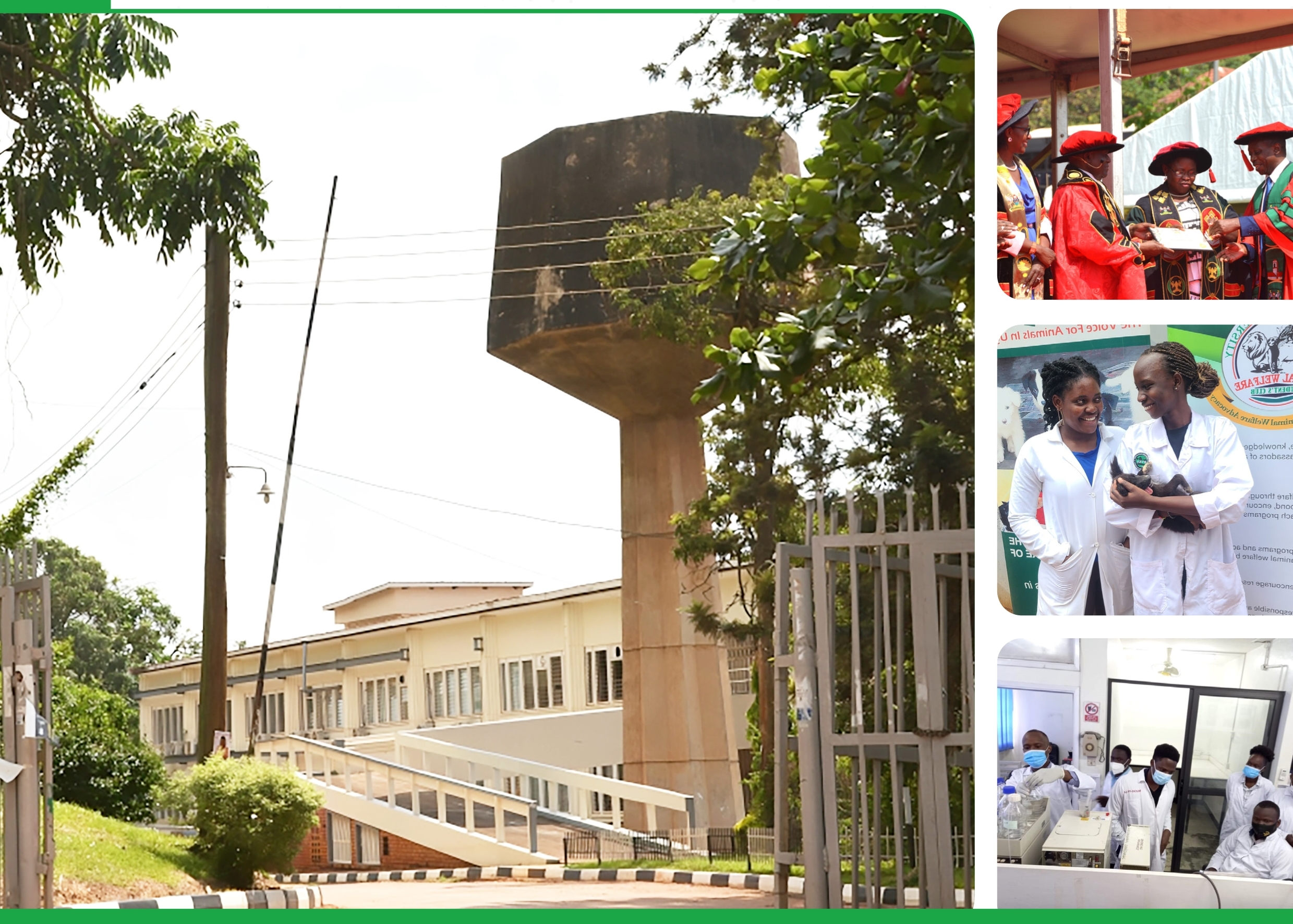
It is my pleasure to share the Annual Report for the year 2024, highlighting the various milestones realized in the College of Veterinary Medicine, Animal Resources, and Biosecurity. First and foremost, I wish to congratulate all of us for the dedication and effort rendered in the running of the college during the period. This collective commitment enabled us to excel in several areas, in line with the mandate of the college and Makerere University at large.
Our mandate teaching and learning, research and innovation, as well as knowledge transfer and partnerships, has been diligently pursued through the concerted efforts of all stakeholders, students, teaching staff, administrative teams, and valued partners. The college takes pride in the contributions made by our partners, who continue to support us in fulfilling this mandate. We particularly appreciate Norbrook (U) Ltd, which has consistently recognized the best-performing veterinary students with cash prizes annually since 2021.
Among the key achievements in 2024 was the expansion of research facilities at CoVAB. The college successfully established new, state-of-the-art laboratories, including an advanced Biomarker Discovery and Translation Research Laboratory, which continues to lead in developing point-of-care diagnostic kits for infectious and noncommunicable diseases, including cancer. The Biomarker Discovery and Translation Research Laboratory at CoVAB represents a significant leap in biomedical research and innovation. This state-of-the-art facility is dedicated to identifying and translating biomarkers into point-of-care diagnostic kits for both infectious and non-communicable diseases, including cancer. In this regard, CoVAB is poised to make tremendous contributions and impacts in advanced diagnostic development through rapid, accessible, and cost-effective diagnostic tools that can be used in both human and veterinary medicine, thereby contributing to improving early disease detection and treatment outcomes.
In the area of interdisciplinary research, the laboratory fosters collaboration among veterinary scientists, medical researchers, and biotechnologists, ensuring a holistic approach to disease management. Given the increasing prevalence of zoonotic diseases, the lab plays a crucial role in bridging veterinary and human health research, contributing to global health security and supporting One Health initiatives. Other achievements at the college are visible in groundbreaking research projects, with several initiatives launched, including studies on zoonotic disease prevention, vaccine development, and drug action mechanisms.
In the area of community outreach, the college expanded its livestock health programs, providing veterinary services to rural communities and enhancing disease surveillance. This is coupled with the increased international Collaborations where CoVAB strengthened partnerships with global institutions, securing funding for One Health initiatives aimed at tackling emerging health challenges.
These advancements and more not mentioned strategically position CoVAB and Makerere University as key players in addressing major animal and human health challenges, particularly zoonotic diseases, which constitute a significant proportion of emerging and reemerging infectious diseases.
The achievements highlighted in this report would not have been possible without the unwavering support, dedication, and collaboration of various stakeholders. We extend our heartfelt gratitude to our students, who are the backbone of our academic community, and whose commitment to learning, research, and innovation continues to propel CoVAB to greater heights. The dedication of our lecturers, researchers, and administrators has been instrumental in driving the college’s mandate forward. Your passion for education, mentorship, and scientific discovery is deeply appreciated. The partners and collaborators, including institutions, organizations, and industry stakeholders such as Norbrook (U) Ltd, have supported our initiatives and strengthened our capacity through funding, knowledge exchange, and collaborative projects. Your contributions are invaluable.
Together, these contributions have made 2024 a truly remarkable year for CoVAB. As we move forward, we remain committed to strengthening these partnerships and building on our shared successes. Thank you for being part of our journey. As we move forward, we anticipate an even more successful period ahead, and together, we shall achieve all that we set out to do.
Prof. Frank Norbert Mwiine
PRINCIPAL
Research
Mak and MSU Host Landmark Symposium on Insects for Food, Feed, and Food Security in Africa
Published
3 weeks agoon
June 10, 2025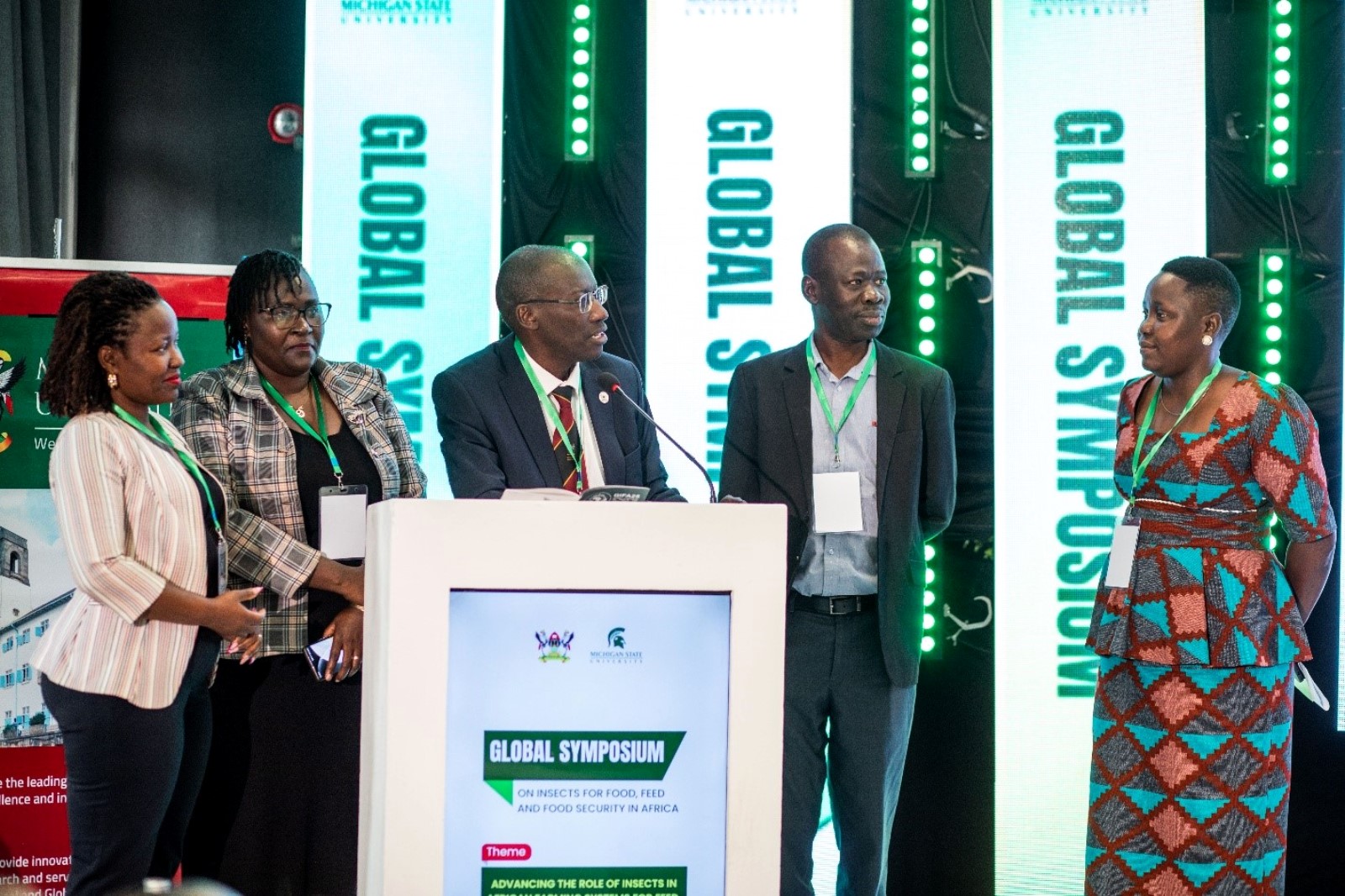
A groundbreaking symposium exploring the role of insects in African farming systems concluded on June 6th, 2025, at Onomo Hotel in Kampala. Convened by Makerere University’s College of Veterinary Medicine, Animal Resources and Biosecurity (CoVAB) in collaboration with Michigan State University (MSU), the event drew participants from over ten countries, including researchers, development experts, regulators, and practitioners.
Under the theme “Advancing the Role of Insects in African Farming Systems for Feed, Food, and Food Security,” the two-day gathering aimed to share knowledge and experiences on integrating insects into food and feed systems to address food security challenges across the continent. The discussions revolved around four key sub-themes namely; Insects as animal feed to promote sustainable livestock production and livelihoods; Insects for human food and food security, including indigenous insect-based diets; Insects for improved soil health and crop production and Commercialization of insect farming, with a focus on regulation and standardization.
The symposium commenced with opening remarks delivered on behalf of Makerere University’s Vice Chancellor, Prof. Barnabas Nawangwe, by his representative, Prof. Frank Norbert Mwiine, Principal of CoVAB. He welcomed participants and commended Dr. Deborah Amulen, Lecturer at CoVAB and chief convener, for organizing a well thought out event. He emphasized that the symposium would not only raise awareness of the role of insects in Uganda’s and Africa’s socio-economic development but also help place insects on the agenda for broader discussions and integration into food security strategies. He said the event served as a platform for knowledge exchange, highlighting the untapped potential of insect farming in transforming food security, sustainable agriculture, and economic growth.
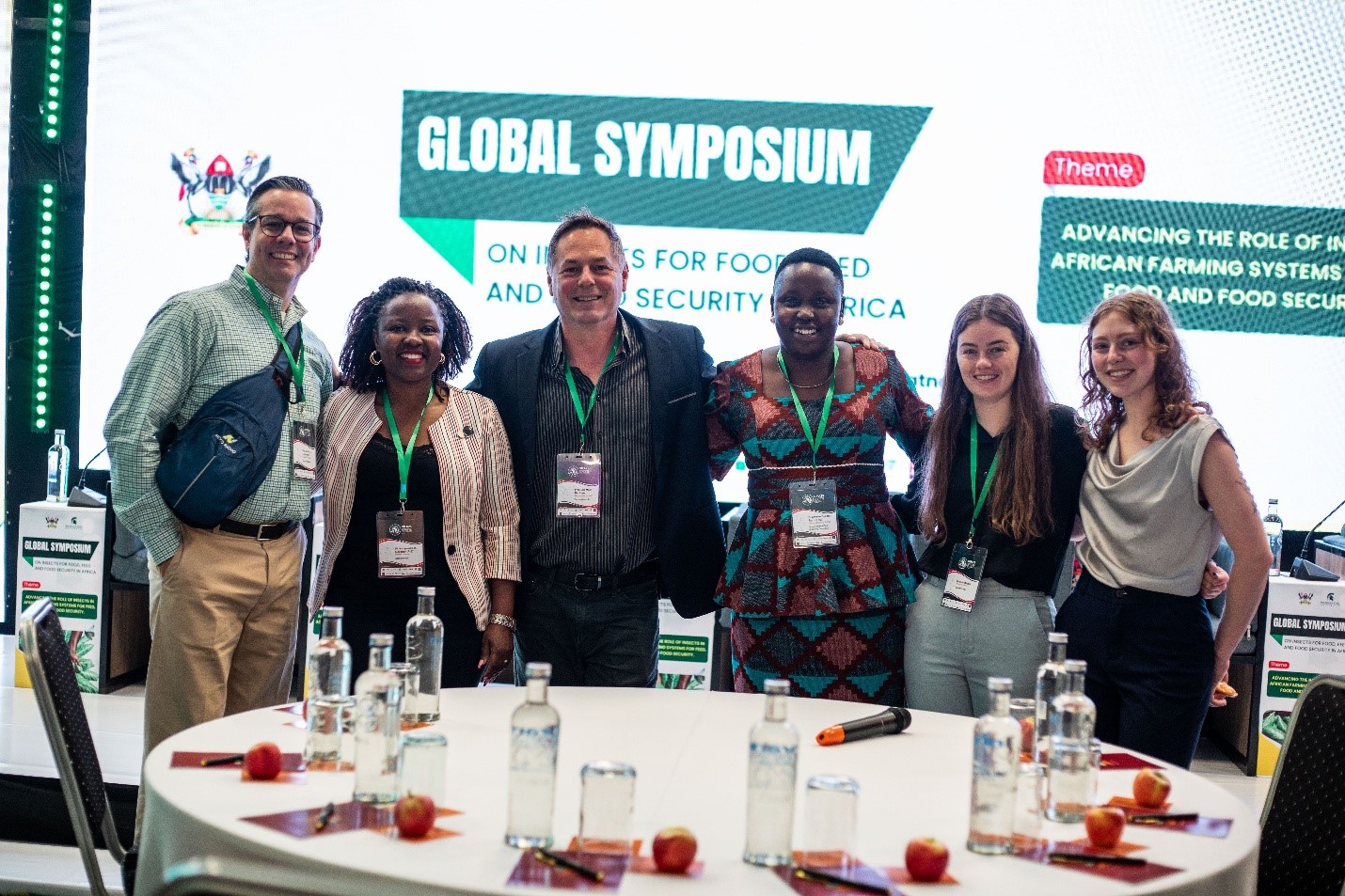
Key facilitators at the symposium were esteemed experts from leading institutions worldwide, who shared their insights on insect-based food systems and sustainable agriculture. Among the distinguished speakers were Prof. Jeffrey K. Tomberlin from Texas A&M University, Prof. Eric M. Benbow from Michigan State University, Prof. Florence Dunkel from Montana State University, Dr. Denise Beesigamukama, a Postdoctoral Fellow, ICIPE Kenya and Dr. Deborah Amulen the host from Makerere University. These are exemplified in their contribution towards academic research and leadership, policy and industry impact and more importantly their expertise in insect science.
During the deliberations, the experts emphasized that insects offer a viable, sustainable, and nutrient-rich solution to Africa’s growing food demands. The event underscored ongoing research and commercialization efforts aimed at mainstreaming insect farming into the agricultural sector. As global interest in alternative protein sources continues to rise, the symposium marked a significant step toward harnessing the potential of insects to enhance food security in Africa.
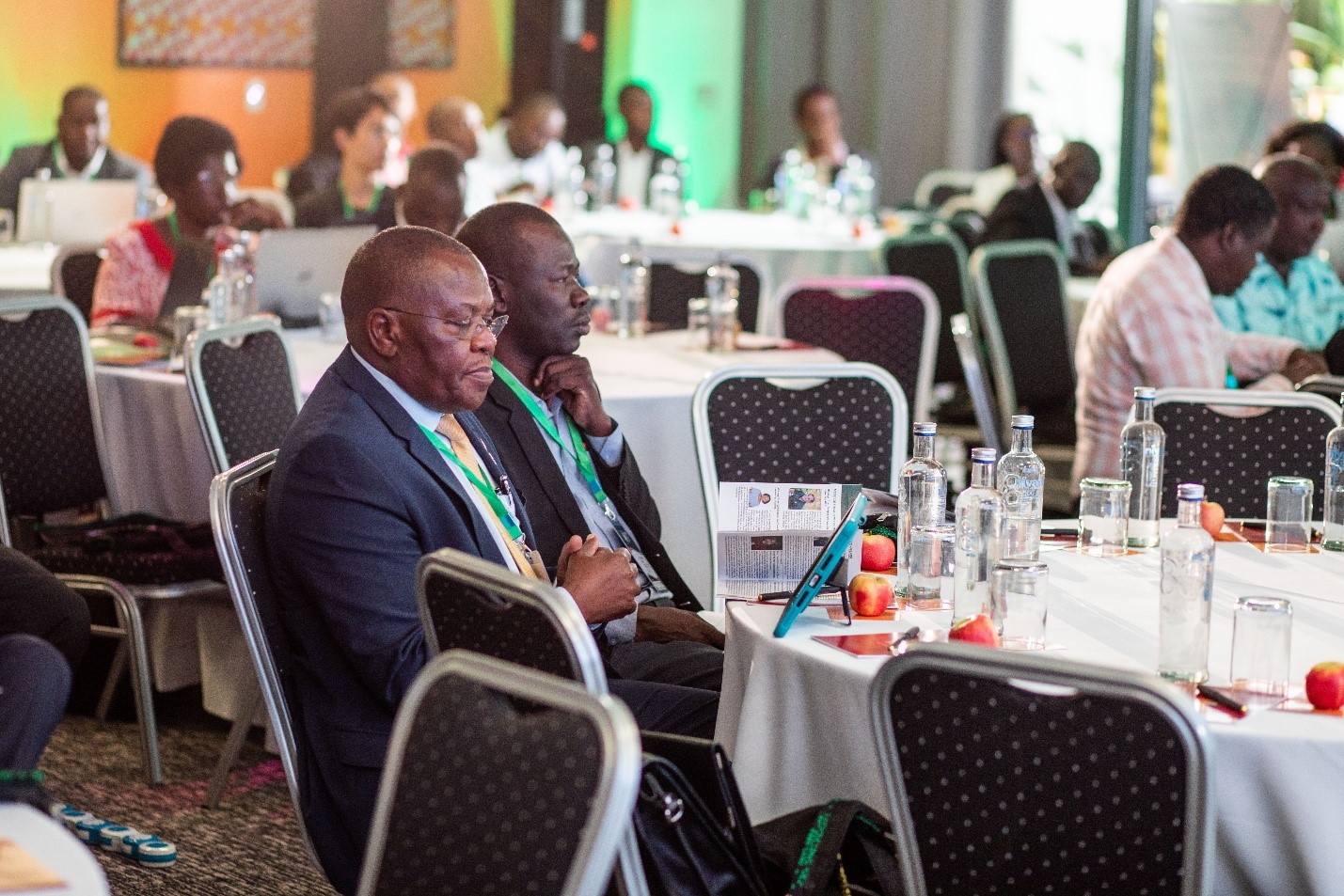
Experts underscored that Africa is home to over 470 recognized edible insect species, providing a rich source of proteins, fats, and essential micronutrients. Insects have historically been a staple in diets across Uganda, Southern Africa, and other regions, serving as a vital food source in times of drought, conflict, and food scarcity. One of the most discussed innovations at the event was the large-scale farming of Black Soldier Fly, which is being utilized to produce not only the larvae but also frass, a high-protein animal feed and organic fertilizer to enhance soil health and boost agricultural yields.
Several scholars presented their research in the area of Insects, where together with the farmers, industry representatives, policy makers and practitioners contributed valuable perspectives on advancing the role of insects in food security, animal feed, and ecological sustainability in Africa. Their discussions underscored the importance of research, policy, and commercialization in expanding insect farming across the continent.
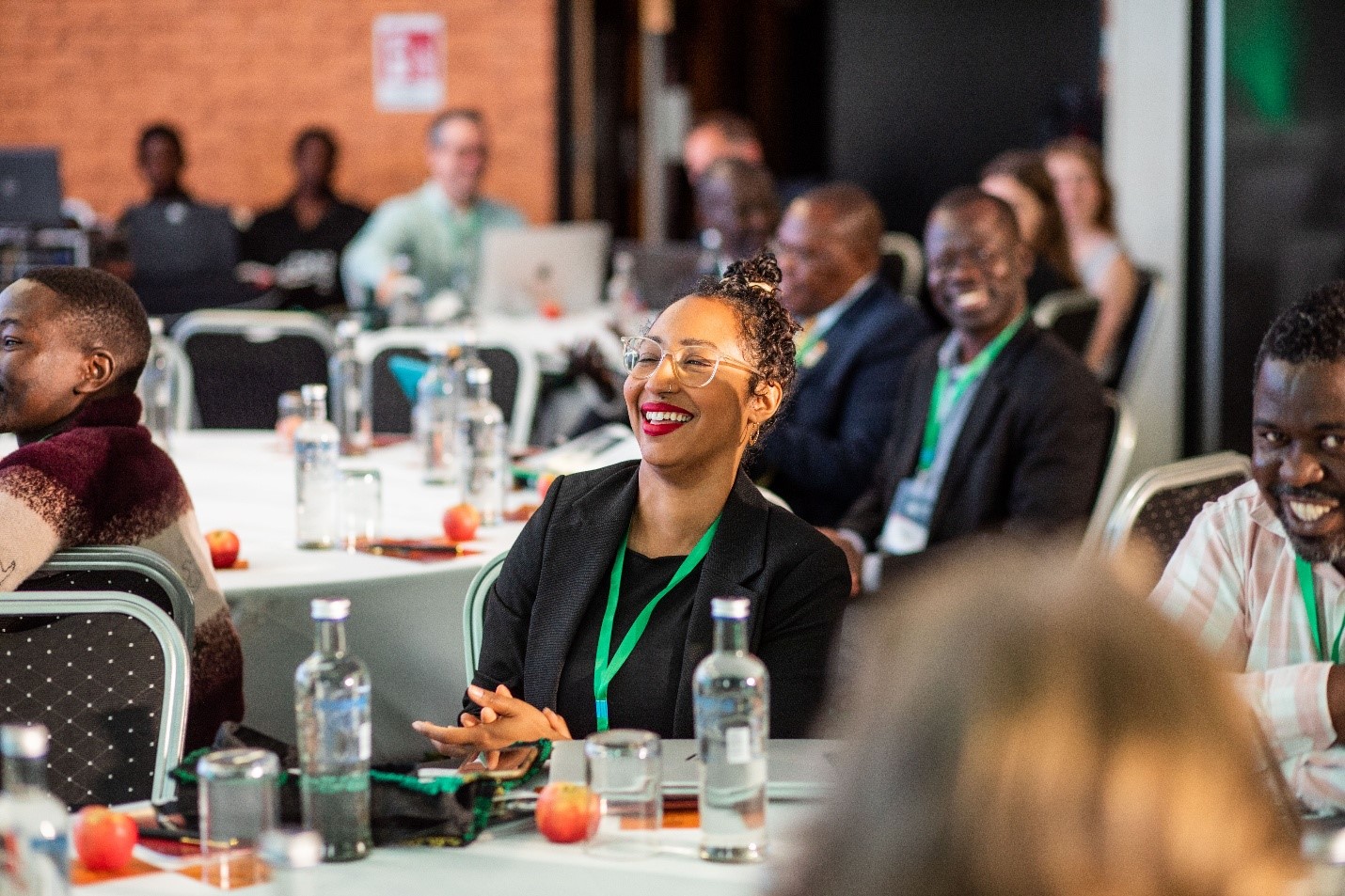
One of the keynote discussions highlighted Uganda’s rich tradition of consuming insects as part of its food culture, reinforcing their significance in nutrition and sustainability. Participants shared insights on local insect consumption practices and their role in livelihoods, drawing from countries like Cameroon, Malawi and many others represented at the event. The forum also featured representatives from key institutions, including the National Council for Science and Technology and The National Agricultural Research Organization (NARO) which contributed perspectives on research, policy development, and commercialization of insects as sustainable food sources, the Ministry for Agriculture, Animal Industry, and Fisheries (MAAIF), emphasizing the Ugandan government’s support for insect farming initiatives.
The Kenya based scientific research institute, the International Centre of Insect Physiology and Ecology (ICIPE) played a key role in the discourse and exhibited several innovations arising from research and their work in insects. Experts explored how insects can revolutionize animal feed production, providing an affordable, high-protein alternative to conventional sources.
With global attention shifting toward alternative and sustainable food sources, experts stressed the need for policy standardization and enhanced investment in insect-based food systems across Africa. During the event, MAAIF announced a $325 million investment through a six-year Smart Agriculture Transformation Project, aimed at expanding sustainable farming practices, reducing environmental impact, and increasing food security through alternative protein sources.
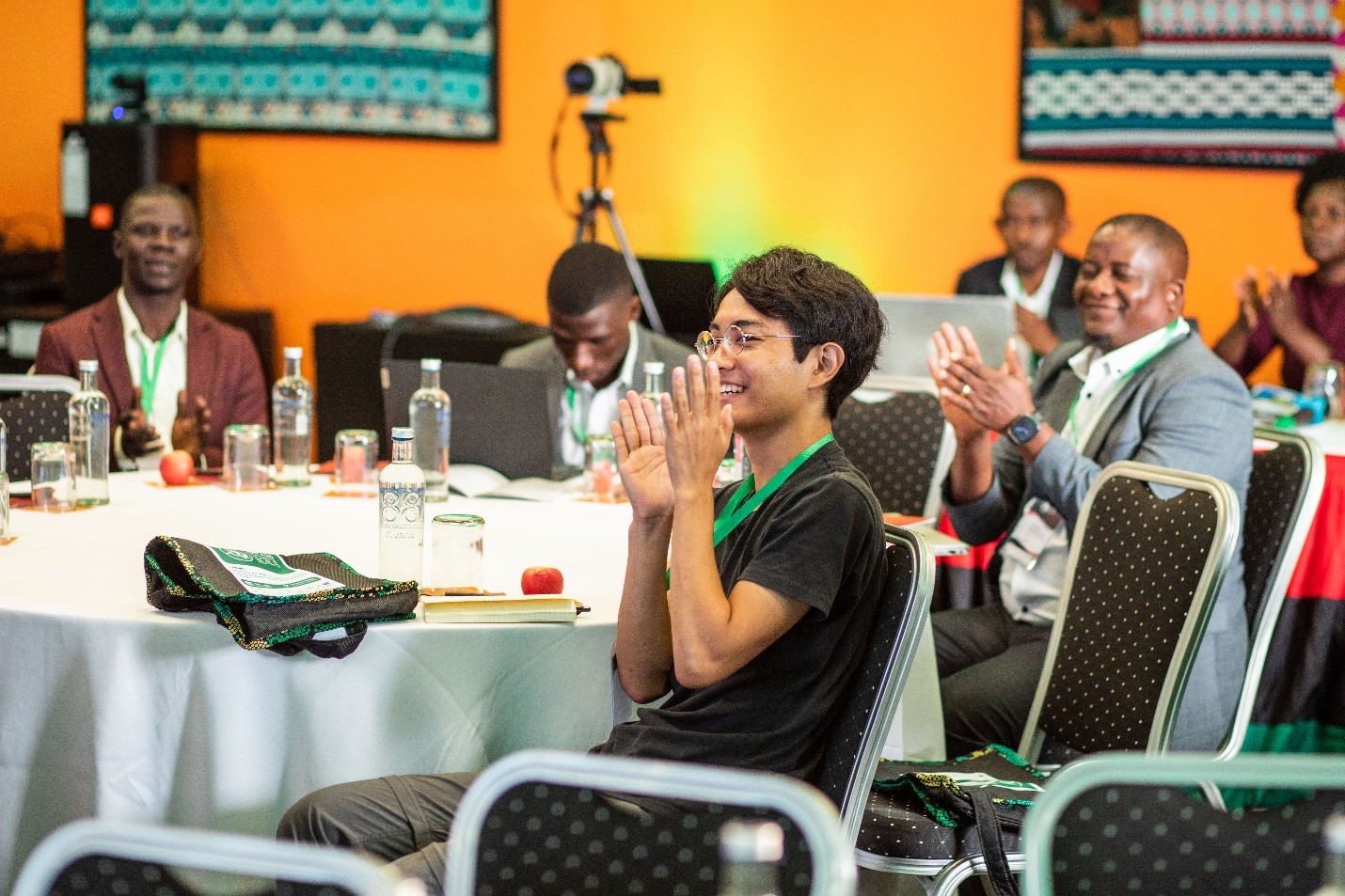
The symposium reaffirmed Africa’s position at the forefront of insect farming research, with discussions centered on scaling production, improving regulation, and leveraging indigenous knowledge for food security solutions. Moving forward, participants emphasized the importance of quality control, standardization, and policy frameworks to ensure safety, scale production, and boost market competitiveness. With Uganda leading discussions on alternative protein sources, the symposium laid the foundation for future innovations in agriculture.
Veterinary & Biosecurity
Makerere Receives Scientific Equipment worth over UGX 1.4 Billion
Published
3 weeks agoon
June 10, 2025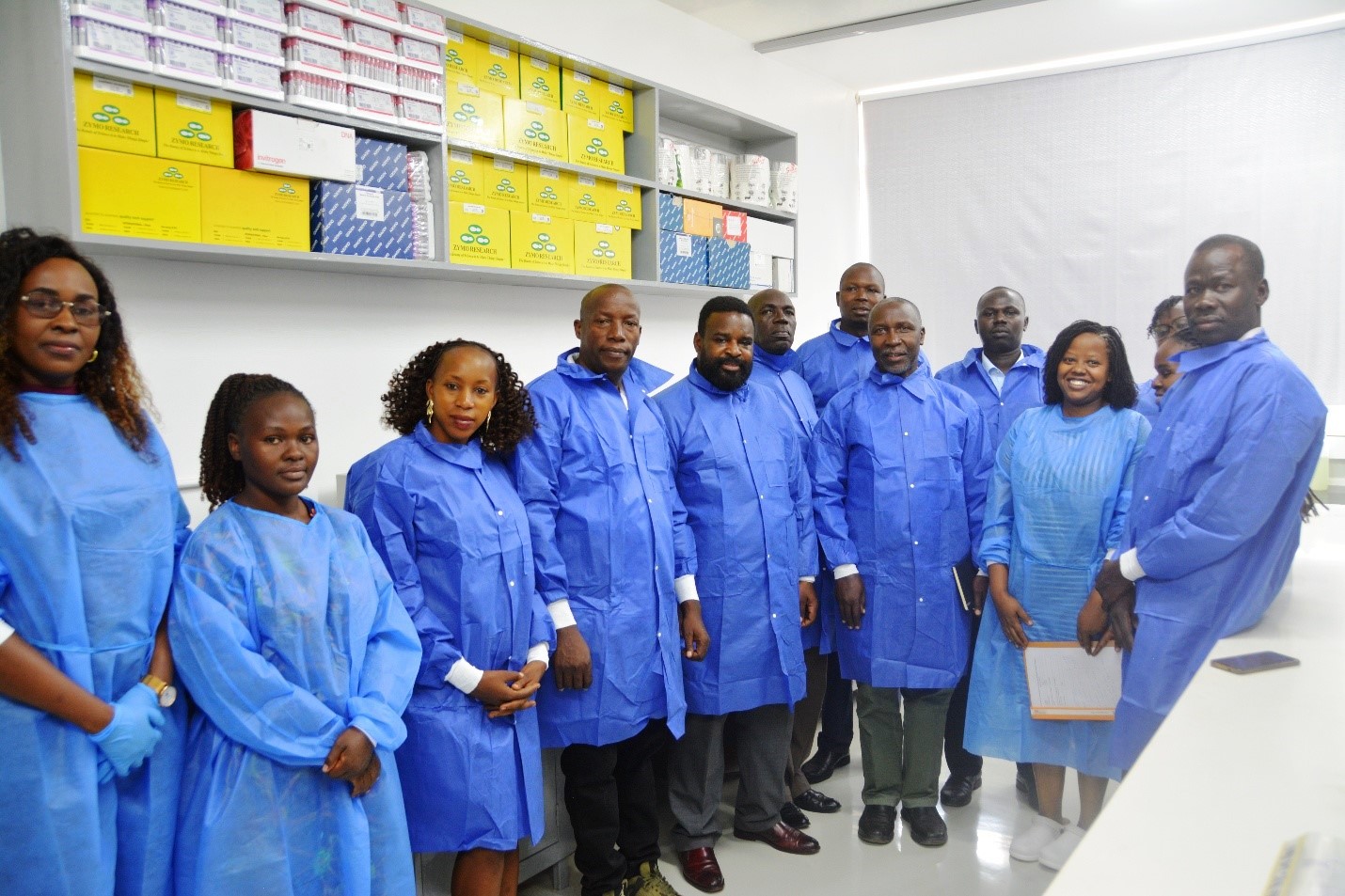
Makerere University has secured a valuable donation of scientific laboratory equipment worth USD 400,000 (Shs. 1.4 billion) through the Seeding Labs’ Instrumental Access Program. This equipment will significantly enhance teaching, research, and diagnostic services at the College of Veterinary Medicine, Animal Resources and Biosecurity (CoVAB).
Following the announcement of a successful application in May 2024, Makerere joins a global network of 137 institutions across 39 countries, gaining access to advanced tools that will elevate STEM education and innovation. This development strengthens the university’s commitment to scientific excellence and fosters collaboration in veterinary medicine and related fields.
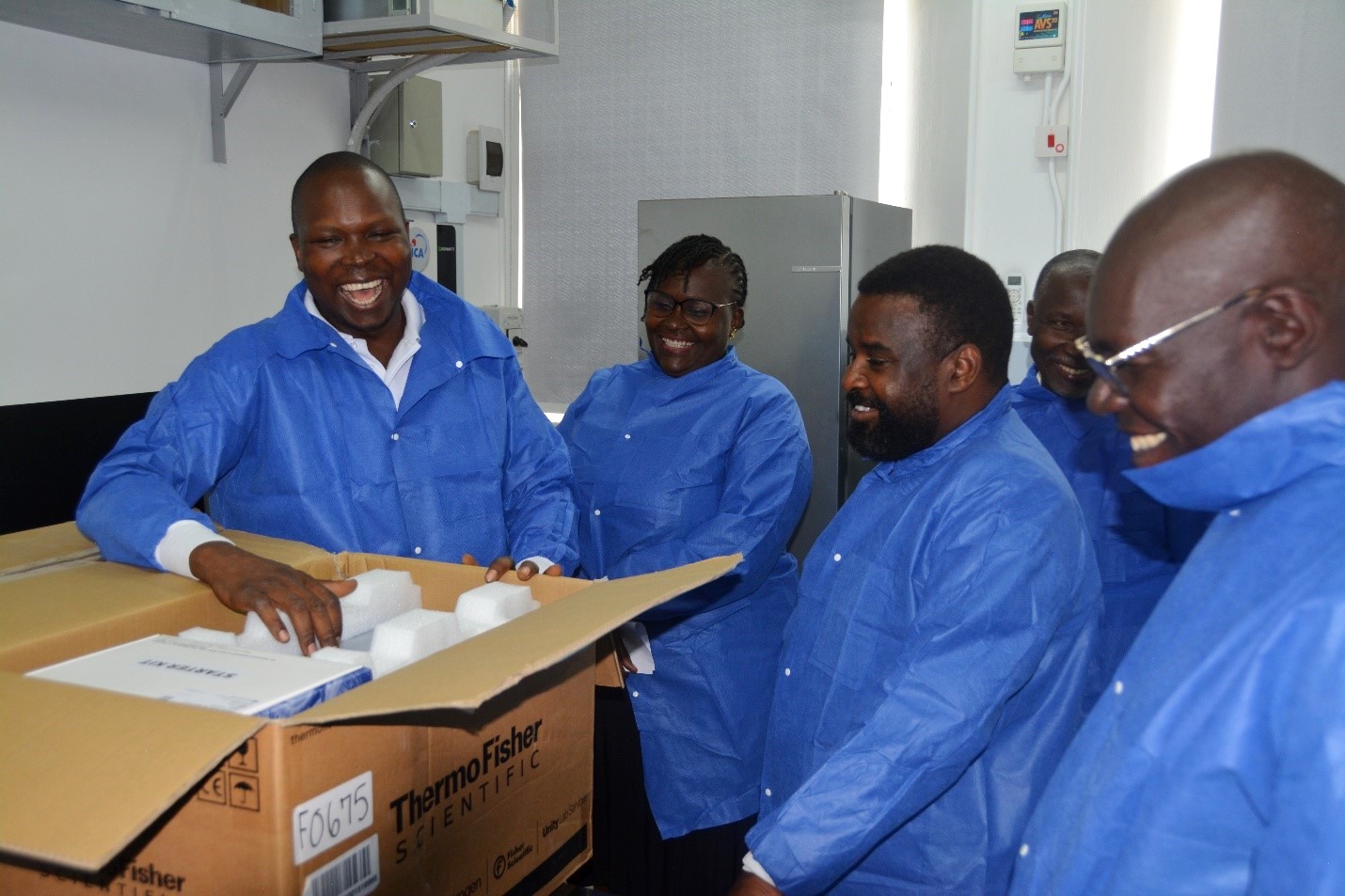
The consignment was received at the College of Veterinary Medicine, Animal Resources and Biosecurity and witnessed by Prof. Edward Wamala, who represented the Vice Chancellor, Prof. Barnabas Nawangwe. In his remarks, Prof. Wamala described the newly acquired scientific equipment as a significant milestone in Makerere University‘s pursuit of academic excellence, innovation, and impactful research. He emphasized its transformative role in strengthening research infrastructure, advancing ongoing scientific inquiry, and empowering both students and faculty to engage in high-impact studies.
Expressing appreciation to Seeding Labs’ Instrumental Access Program for their partnership, he underscored that this contribution was more than a donation, rather an investment in the future of Uganda and Africa at large. He highlighted that the support reflects confidence in Makerere’s students and scientists, recognizing their responsibility to address pressing global challenges in animal health, biosecurity, and public health.
Prof. Wamala further noted that the College of Veterinary Medicine, Animal Resources, and Biosecurity plays a vital role in addressing issues at the intersection of human, animal, and environmental health which is the core of the One Health approach that is emphasized today. With the newly acquired equipment, the college’s capacity will be greatly enhanced, improving diagnostic capabilities, supporting the livestock industry, and contributing to disease surveillance efforts at both local and national levels, he noted.
The Deputy Principal CoVAB, Assoc. Prof. James Okwee-Acai said the equipment received is a significant milestone in the college in its efforts to strengthen science and research capacity. He commended the management of Makerere University for the contribution and support that enabled the shipment and clearance of the consignment. While commenting about the equipment contained in the donation, Prof. Acai said many of items were state-of-the-art and would definitely boost the work of teaching and learning at the college across the two schools.
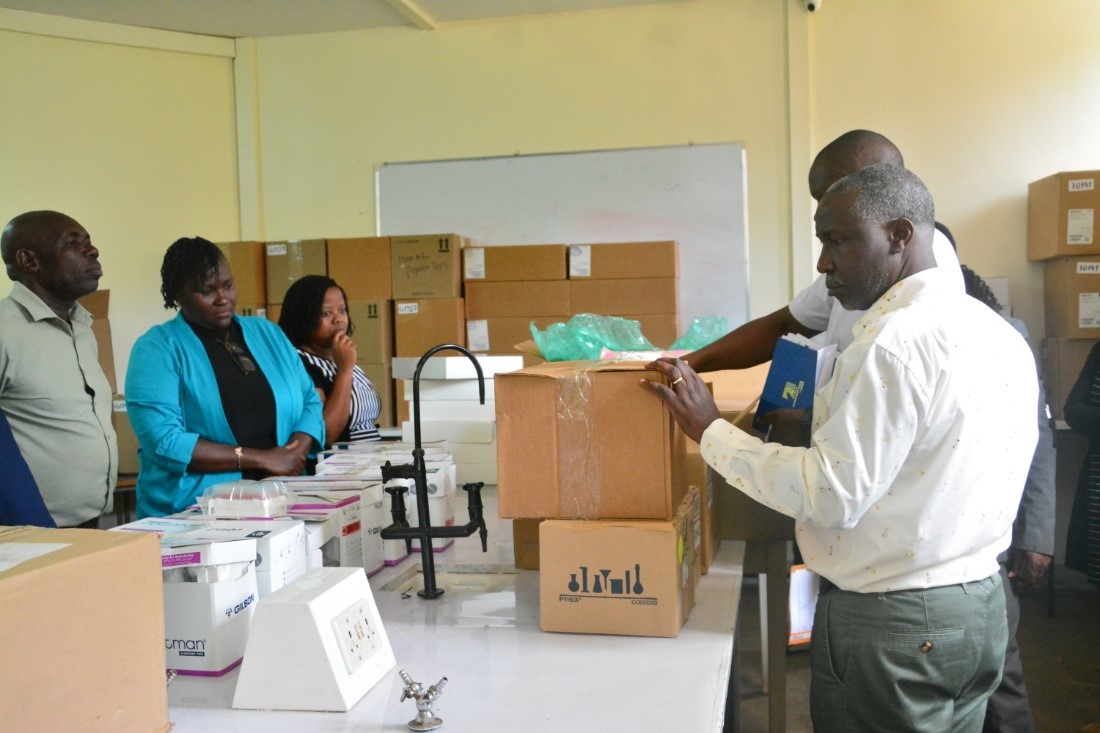
The equipment is expected to greatly enhance the University’s ability to conduct cutting-edge research and provide high quality education in the veterinary sciences. This donation showcases the growing partnerships and collaborations that Makerere University is building to drive innovation and academic excellence. With this valuable addition to its research infrastructure, Makerere University is poised to make even greater strides in advancing scientific knowledge and addressing critical challenges in the veterinary field and looks forward to the transformative impact it will have from training students on the latest analytical techniques to enabling faculty led studies that advance veterinary medicine.
The donors, the Instrumental Access is the flagship program of Seeding Labs, which is a US-based NGO with a mission to increase access to resources for science in developing countries. CoVAB’s participation in Instrumental Access makes Makerere University a member of the community of 137 Instrumental Access awardees in 39 countries worldwide.
The Department of Veterinary Pharmacy, Clinical and Comparative Medicine, Makerere University was chosen for the Instrumental Access award after a rigorous and competitive selection process that receives and evaluates applications from institutions around the world. To be considered, applicants outlined the ways that an infusion of scientific equipment would remove barriers to STEM education and research at their institution, paving the way for new avenues of scientific inquiry and expanding hands-on opportunities for students.
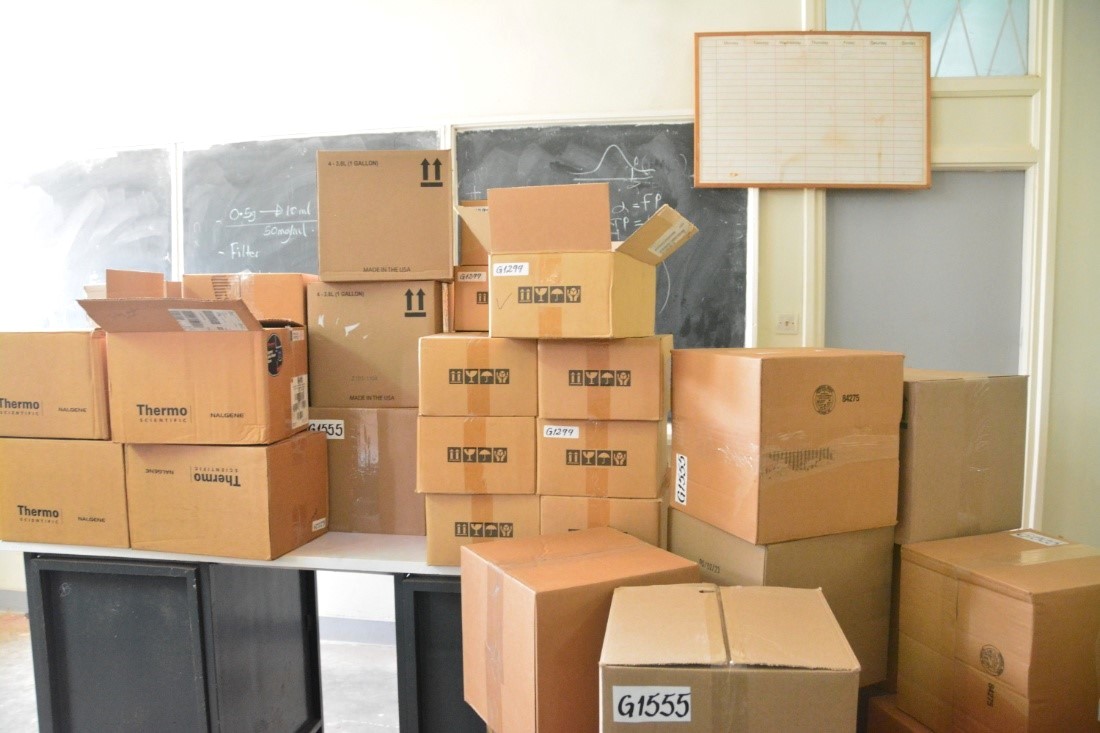
The equipment will provide a foundation for other critical resources that allow scientists to generate new knowledge, leverage sustainable funding, and better prepare university students for the scientific workforce and innovation economy.
More photos from the unveiling
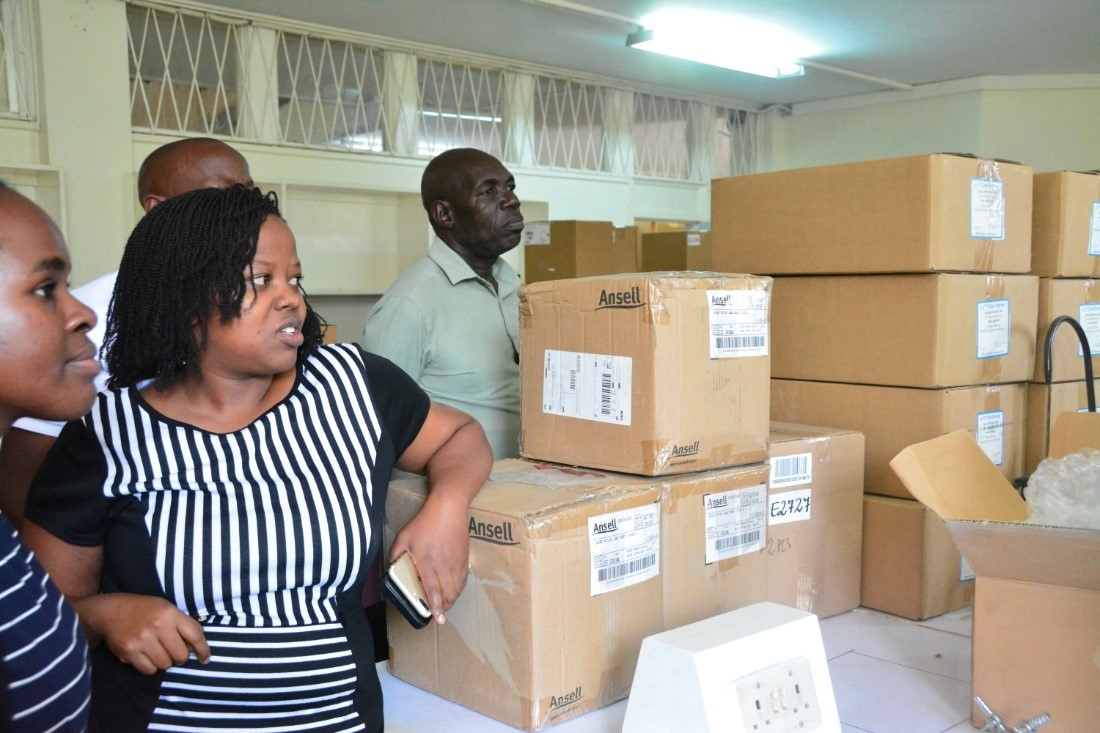
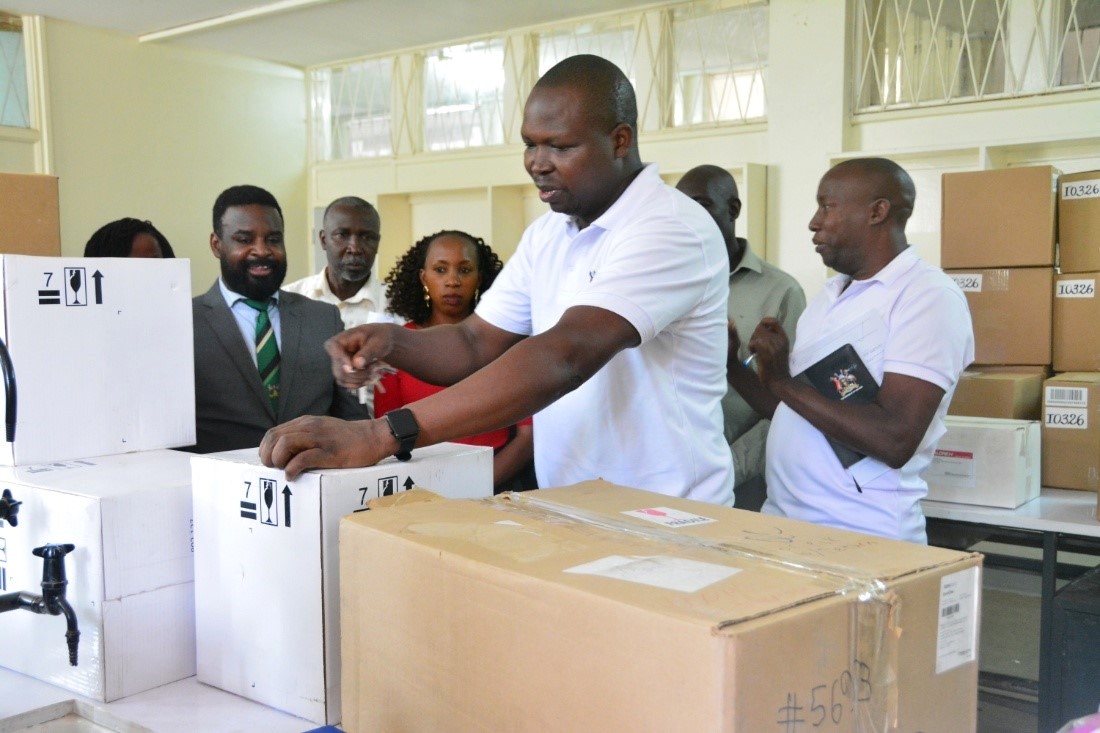
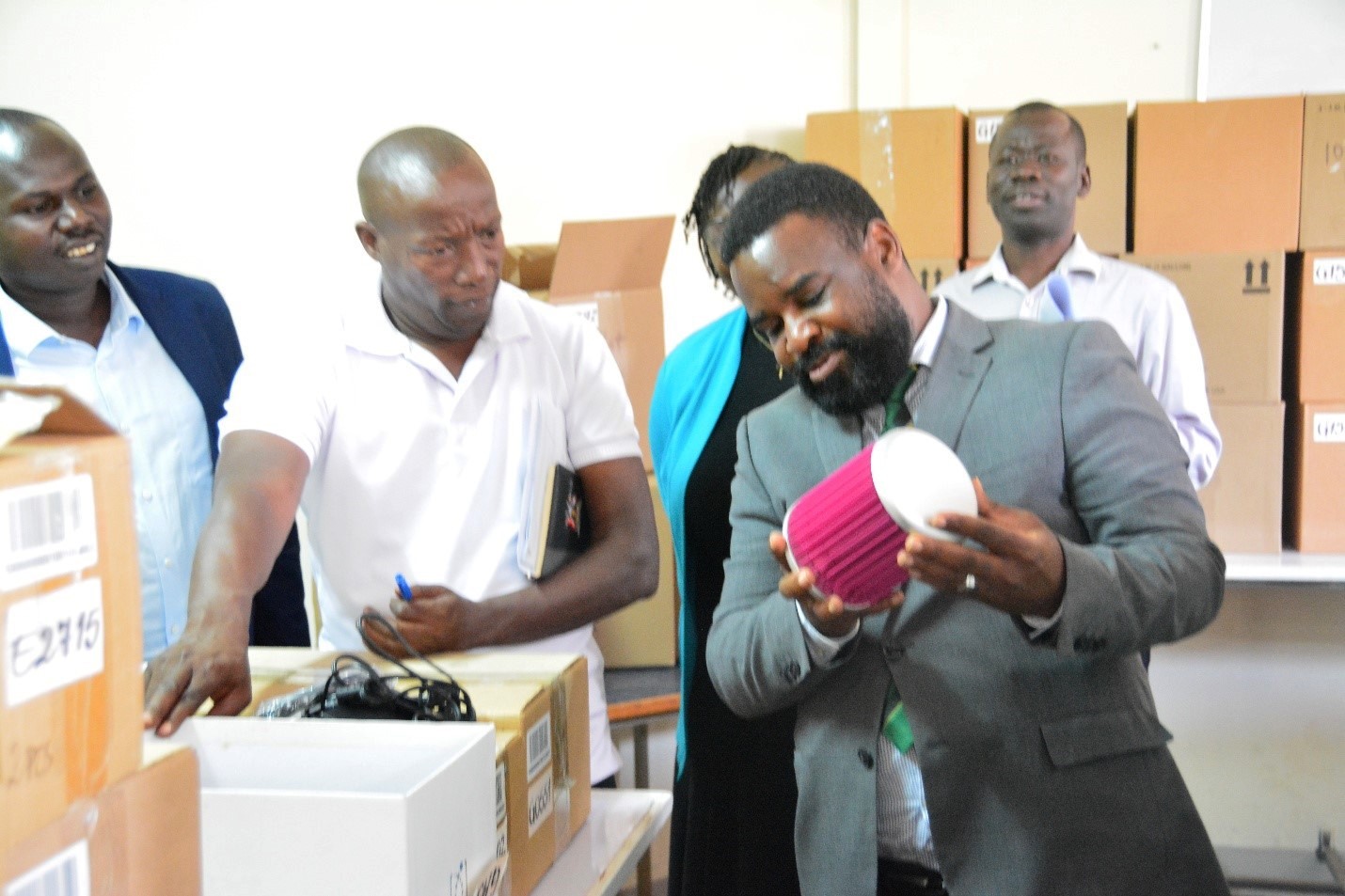
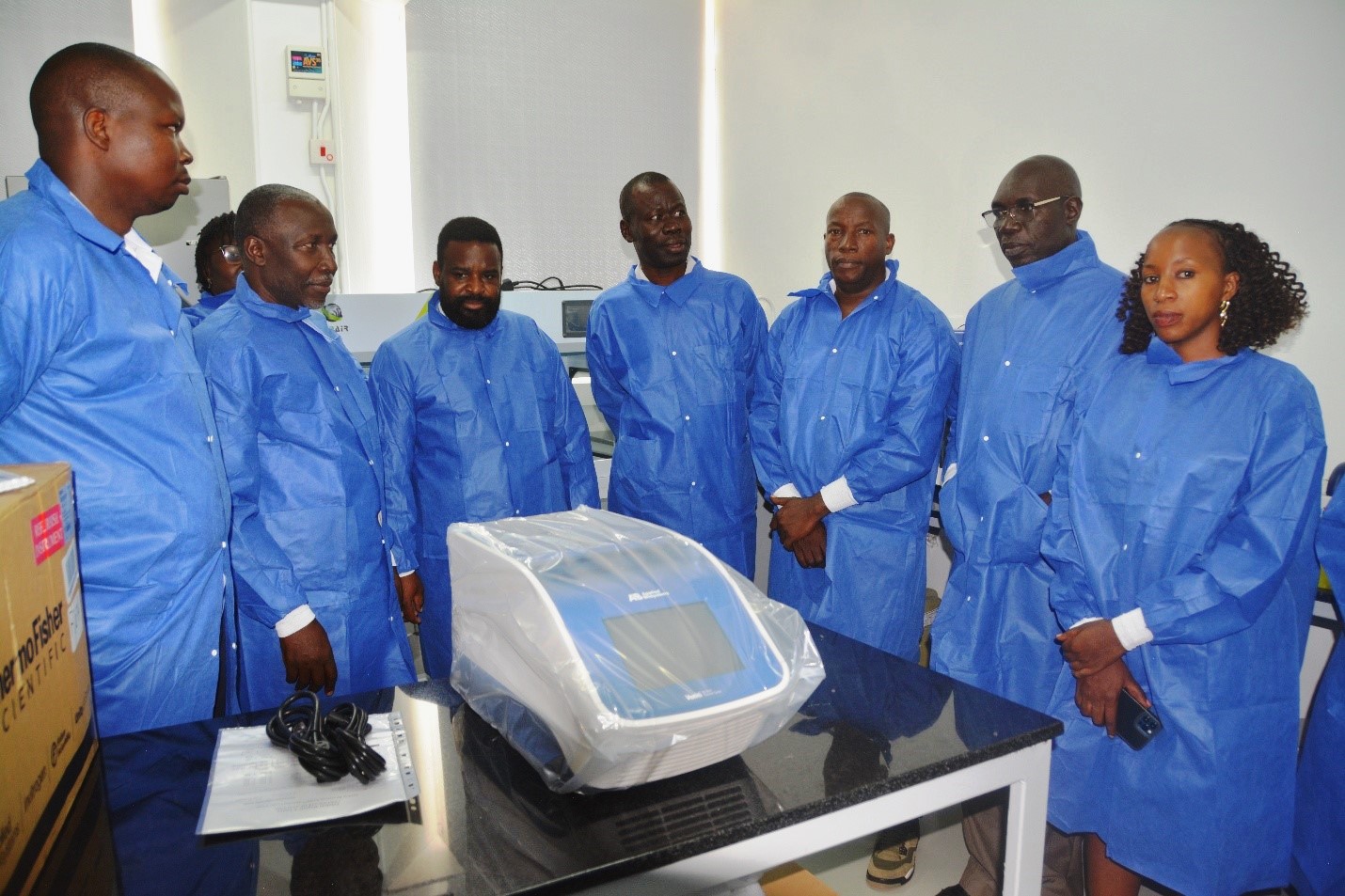
Trending
-

 General3 days ago
General3 days agoMature Age Scheme Exam Results for 2025/2026
-

 General6 days ago
General6 days agoFreshers’ Joining Instructions 2025/2026
-

 General1 week ago
General1 week agoMastercard Foundation Board pays its inaugural visit to Makerere University
-

 General1 week ago
General1 week agoUVCF Makes Case for HEAC Programme
-

 Natural Sciences2 weeks ago
Natural Sciences2 weeks agoCoNAS Participates in the 2025 National Science Week Exhibition
